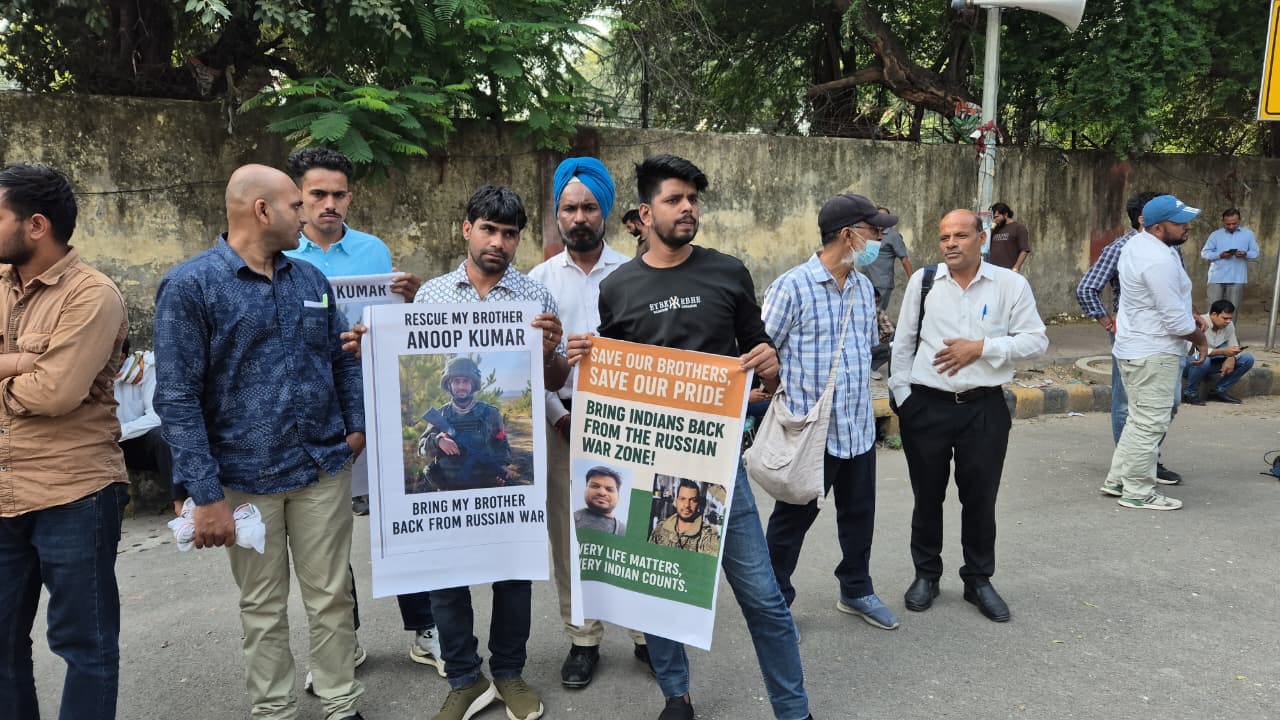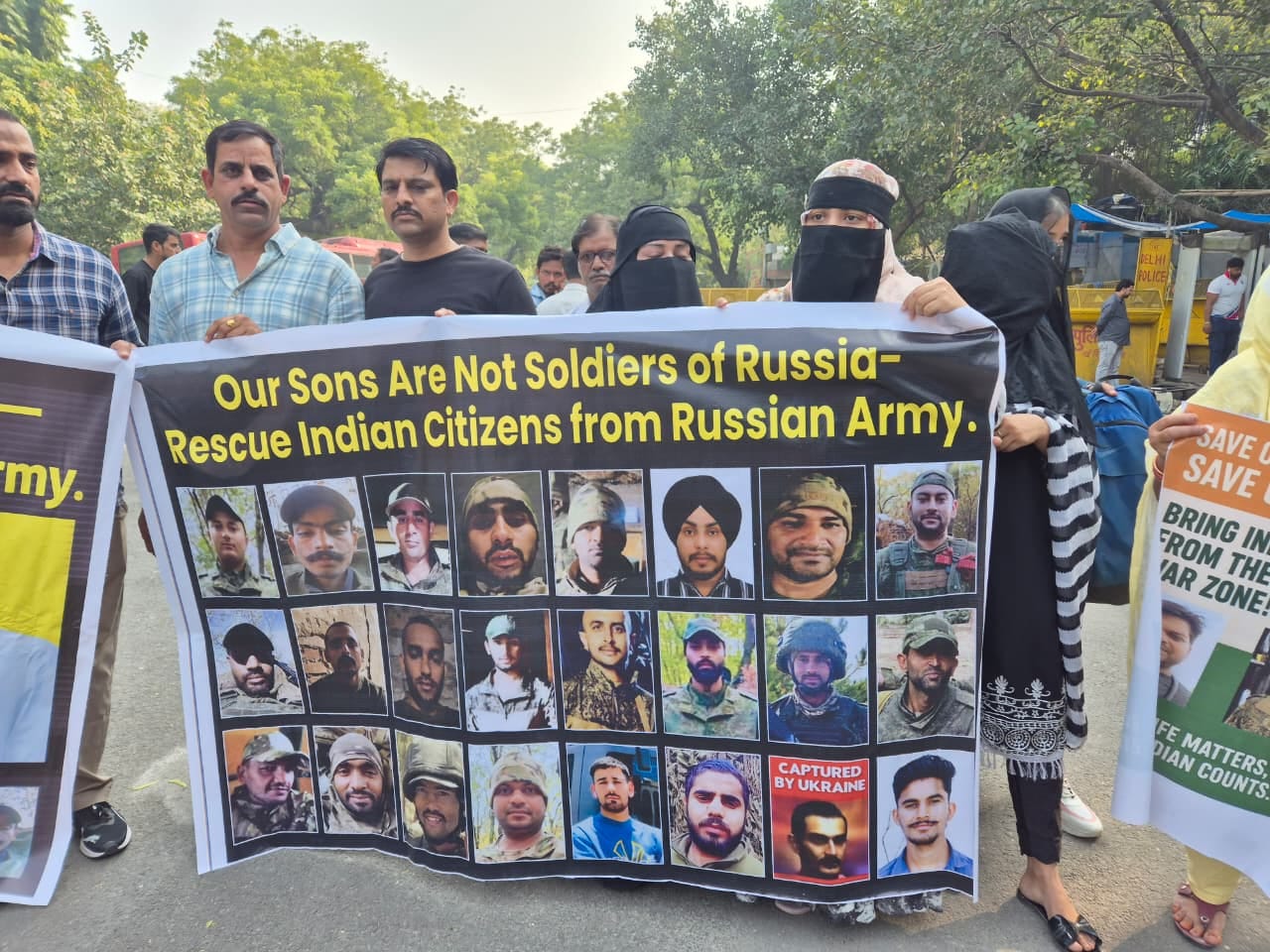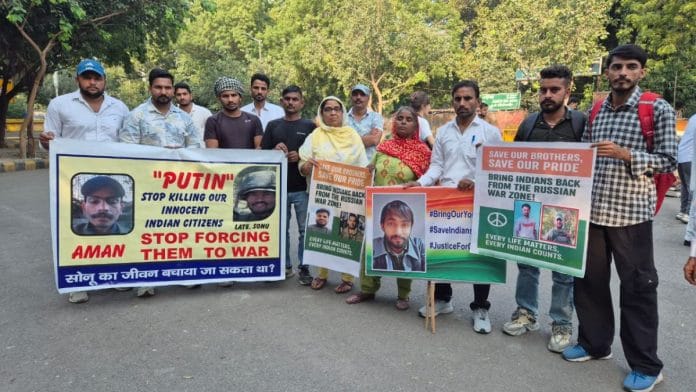New Delhi: “PUTIN! Stop killing our innocent Indians, Stop forcing them into war!!” read one of the many banners at a protest site in Delhi where families of 27 men trapped in Russia’s war against Ukraine had gathered Monday.
The man holding the banner was Ashish Poonia. He has been frantically calling his brother, Aman, who hasn’t picked up for the last 15 days. Aman has been in Russia for almost a year, and was recently recruited into the Russian army’s war effort in Ukraine. Now, the 29 year old is panicking.
“Indian government should bring back my brother alive, not in a body bag. They should work on this immediately,” said Poonia/
Just a few days ago, a body bag containing the skeletal remains of his friend, Sonu, arrived in his village in Hisar district. He too was fighting the foreign war in Russia.
“He (Aman) has come under heavy shelling, and his ankle is injured. He’s unable to walk. He tells me that the Russians do not give him sufficient food or rest. We want him back immediately,” Poonia told ThePrint.
The induction of young Indian men into the Russian army has become a diplomatic issue between Russia and India. New Delhi has, at the highest levels, repeatedly informed Moscow not to recruit Indians into the war effort, and Moscow has given multiple assurances.

At ThePrint OffTheCuff, which was held on 29 October, Russian envoy Denis Alipov had informed ThePrint’s editor-in-chief Shekhar Gupta that Russia has not recruited any Indian citizens into the war effort since March 2025.
“We have from the very start stressed to the Indian government that the Russian Army does not recruit Indians… if a foreigner comes to a recruiting centre and signs the contract voluntarily… Nobody makes him sign that contract,” he had said.
At least 100 Indians had signed up to be in the Russian military between 2023 and 2024. The issue was directly raised by Prime Minister Narendra Modi in Moscow last year.
And yet, at least 100 people and 27 families from all over the country—Maharashtra, Rajasthan, Telangana, Haryana, Punjab—gathered at the protest site in Jantar Mantar on 2 November with tears in their eyes, asking for their sons and brothers to be brought back immediately.
Families at the protest site
Shahida Khatun has been crying non-stop, eyes turning red.
“My son is in a lot of trouble. And I’m unable to save him. Please help me save him, please bring him back!” she cried.
Her 29-year-old son, Nizamuddin Ansari from Mumbai, went to Russia three months ago with the promise of a job in a warehouse, but was inducted into the army by an agent.
“When he was given training, he was told it was for the security guard job that he had been hired for. But before he knew it, he was sent to the front lines,” his brother Chand Mohammad said.

Ansari had been working as a bouncer at the airport before he went to Russia in search of a better-paying job. Mohammad added that Ansari didn’t understand the contract he was signing, which was written in the Russian language.
The family has also uploaded an audio by Nizamuddin on Facebook, in which he can be heard crying about the work conditions.
“We have to walk 16 kilometres everyday through an area dotted with landmines. Many soldiers have died on the landmines, while others are shot down by drones,” he cries in the audio. “The Russian soldiers coerce us to participate. They tell us that they’ll shoot us dead if we refuse to walk down the path,” he says, adding that he is in Kupiansk city.
Almost all family members have the same story of recruitment. Their relatives went to Russia on the promise of studies or a job offered by agents, and then were forcefully recruited into the war effort.
Family members are concerned that their relatives are being made to fight even though they have sustained injuries.
“My cousin has sustained injuries in his leg but has received no proper medical assistance for it. The last time I spoke to him, he had been shot in the leg. I don’t know where he is now,” Sandeep Kumar from Jind said. His cousin, Anoop, went to Russia around two months ago.
ThePrint has sent queries to the Ministry of External Affairs as well as to the spokesperson of the Russian embassy in India, to ask about the whereabouts of the concerned people, and how they’ll be repatriated. A response is awaited.
(Edited by Theres Sudeep)






